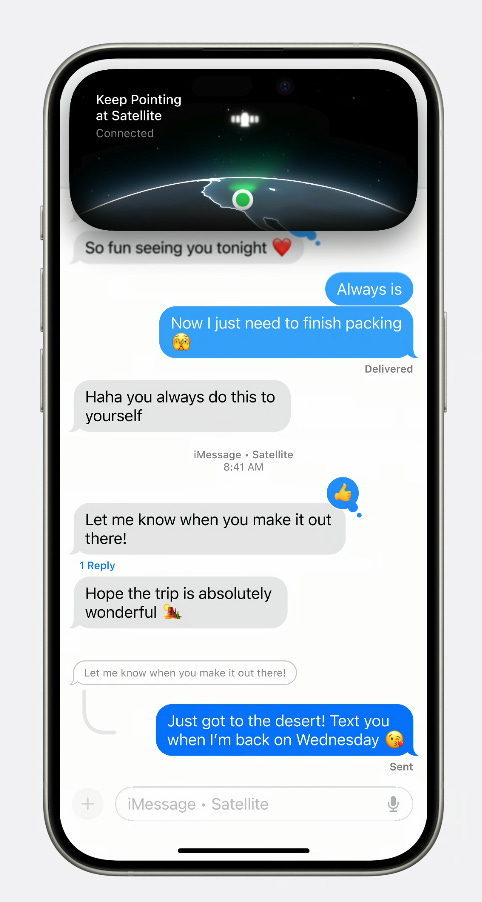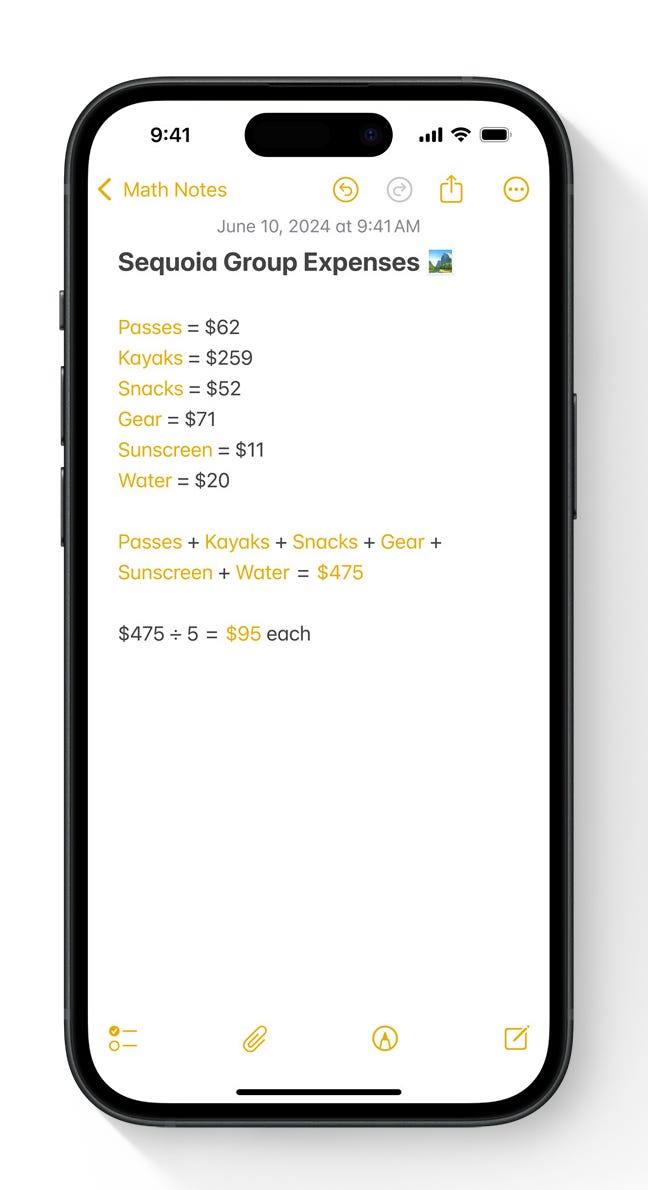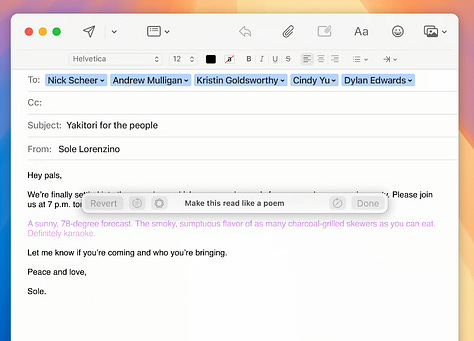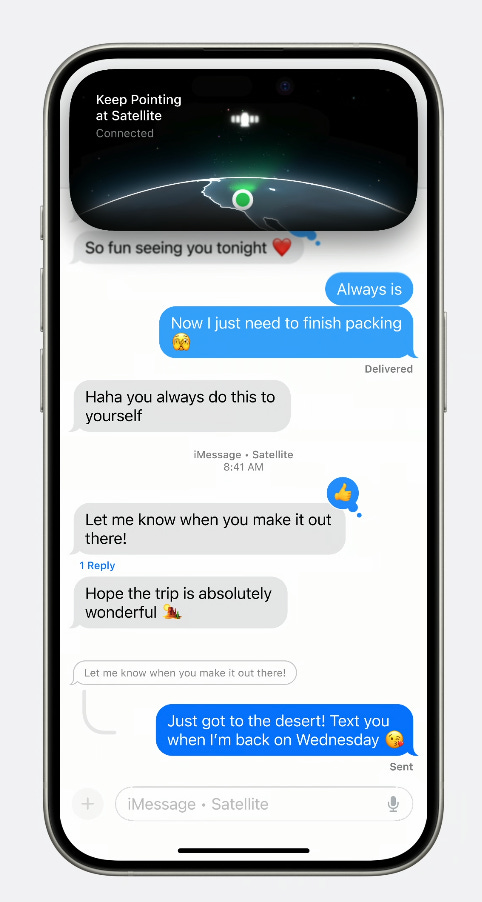What's new in Dimension Apple?
Revisiting our favorite parallel universe. PLUS: What happened to Twitter likes?
Greetings from Read Max HQ! In today’s newsletter:
I revisit “Dimension Apple” and examine the iOS 18 era--in particular, a groundbreaking change in how Dimension Apple residents text each other
I look at the removal of “likes” on Twitter and present a unified theory for the current Twitter product roadmap
A reminder! Read Max is my full-time job, and I’m able to spend this much time at it (reading Apple marketing materials) thanks to the generosity of subscribers. Independent tech reporting, criticism, and shit-posting is time-consuming,. Ninety-nine percent of my revenue comes from readers who value what I do enough to pay for it. If you find this newsletter $5 worth of entertaining, informative, or important every month, please consider upgrading your subscription:
The state of Dimension Apple for 2024
Every year, thousands of perverts and degenerates across the globe gather around their disgusting little laptops to watch the keynote address of Apple Inc.’s Worldwide Developer Conference, a mystical gathering in which a succession of Apple executives sway and bounce slightly while reciting new features in the company’s six different operating systems, each of which corresponds to one of the six wings of the seraphim.
The “big news” of this year’s WWDC, according to the mainstream media, is the introduction of “Apple Intelligence,” the umbrella term for a raft of new A.I. features, which do things like create avatars, rewrite emails, and pump the value of Apple stock to a new record high.
If you’d like to read more about “Apple Intelligence” and the questions it raises, this piece by Charlie Warzel and Matteo Wong covers it well. But for Read Max, there is a more pressing concern: What’s new in Dimension Apple?
Dimension Apple, readers will remember, is the strange universe hinted at in Apple’s extensive marketing materials--the world of the fictional characters of whose texts and emails we sometimes see brief glimpses in screenshots used in presentations, advertisements, and accompanying marketing copy. Every year, a new cast of characters in slightly different situations is quietly introduced in the background. What are they doing? What can they tell us about Apple? And what can they tell us … about us?
In terms of social practices, in the iOS 18 Period, Dimension Apple remains largely the same, and occupants maintain the traditional culture of Dimension Apple. They hike constantly…


…they go on group trips…


…and, of course, they throw extremely meticulously planned parties:



That being said, the parties in Dimension Apple seem to be getting noticeably more hip--or, at least, closer to what “hip” might mean in the context of a world where everyone uses Memoji and punctuates their texts:
More dramatically, small changes in Dimension Apple communicative styles can be observed in iOS 18. As a minor example, here are two text conversations shown in quick succession during the keynote, the first with “Nisha” about (presumably) an unnamed TV show1 or movie, and the second with “Tito” about a coffee:
To scholars of Dimension Apple, it is impossible not to notice that this person is texting the exact same thing to two different people who have the same haircut--which suggests to me the texter is a player with a clear physical type juggling multiple partners by simply copy-pasting texts. But more importantly than the doubled text is its content: “Awayyyyyy” in these two conversations stands out to me because, for most of its history, even intentional misspellings and ungrammatical constructions are exceedingly rare in Dimension Apple.
Indeed, in general, while the familiar uncannily polite texting style prevails throughout the WWDC 2024 materials, there is a notable loosening of orthographic standards. The most important change, which I am putting in bold to really emphasize its novelty: For the first time in the history of Dimension Apple, its occupants have stopped putting periods at the end of their texts.
As recently as last year, every text sent in Dimension Apple ended with a period (or other end mark; exclamation points are popular in Dimension Apple), even if an emoji was included. In the intervening months, whatever cultural norm or legal edict obligated this behavior in Dimension Apple has been abolished; now, people text with orthographic abandon:
Similarly, note in the following text conversation that Dimension Apple rules of grammar now allow sentences to begin with “Haha” with no off-setting punctuation, another new development as far as I have been able to tell:
One possible reason for change in orthographic messaging norms may be the introduction of rich-text formatting to Dimension Apple--put to use in the following conversation2 in the misguided ways you have come to expect from the strangely expressive people of Dimension Apple--which can more densely communicate affect.
Beyond the changes in punctuation, however, Apple Intelligence presents intriguing questions about how the people of Dimension Apple write their texts and emails. Below, e.g., is an email from “Jenny Frith.” Jenny’s habit of writing her email in casual sentence fragments isn’t exactly unprecedented in Dimension Apple, but it’s not a common style. No wonder she--a journalism student!--is using Apple Intelligence to make the email more professional!
Even more striking is the “File naming protocols” briefly witnessed in marketing materials. The email on the left below is presented as “before” example; the version on the left is what happens after it’s been “professionalized” by A.I.:
The original email is genuinely unprecedented in the context of Dimension Apple--the depth of its emotion, the directness of its anger, the poetry of its contempt. It sounds, unlike any other text I’ve ever seen in Dimension Apple, like it might have come from a real human being in the world I live in. I can’t imagine what might happen if “Nooka” or “Tito” received that email--certainly the sender would never be invited to Italo night again. Reading it after having read through the rest of the texts and emails in Apple’s marketing materials is like experiencing the part in The Giver where the guy feels what it’s like to break his leg while sledding.
But rather than embrace the effective and memorable communication apparently available to them, the author is shown using Apple Intelligence to transform the email into, well, the kind of thing that is appropriate for Apple marketing materials. Ultimately this seems to be the main point of Apple Intelligence: It helps you turn into a guy who lives in Dimension Apple.
Twitter product roadmap: Reduce rich guys’ attack surface
I have been dismissive in the past of the idea that Elon Musk purchased Twitter as an elaborate and intentional conspiracy to tilt politics to the right, and while I maintain that most of the executive-level decision-making at the company is best accounted for by the size of Musk’s debt load, a lot of the changes to the Twitter product sometimes seem driven by a particular view of political discourse. Take, for example, this week’s announcement that the company would start hiding “likes,” revealed by Twitter’s director of engineering:
For all I know, the “edgy” content he’s talking about is stuff like “increase the top marginal tax rate,” but I suspect it has a lot more to do with, say, race and I.Q. Reactionaries tend to believe that “everyone” agrees with them but is held back from expressing that agreement thanks to oppressive social dynamics--so why not install a technical solution to that problem?
But I tend to think direct effect of this change--and the direct effect of almost all of the Twitter product changes since Musk’s purchase--has been to protect the rich and famous. For all of its faults, which are many, one of Twitter’s best qualities was the extent to which it revealed the rich and successful and famous as loser idiots not much different from the rest of us. Unprotected by publicists and lawyers, they would come on Twitter and say stupid things, get in stupid fights, and “like” extremely questionable tweets, and everyone else was free to gang up and yell at them. This dynamic was not always particularly enlightening or productive, but it could be cathartic, and if nothing else sometimes it drove rich and famous people completely insane, which was at least entertaining.
The person whose public reputation was most damaged by his own Twitter activity was probably Elon Musk, which is why it makes sense that the product roadmap since he took over has mostly revolved around reducing the attack surface for rich and famous users like himself:
Promoting blue-check replies under tweets means that you’re more likely to get fawning sycophants and crypto hustlers in your replies than the “best” “dunks”
Hiding quote-tweets behind two menus means it’s harder to access criticism of a stupid opinion
Hiding likes makes it more difficult to see when a rich and famous person is “liking” dumb-ass tweets or horny bullshit
What’s particularly funny about this product roadmap is that, in a vacuum, it’s probably a smart business idea! Twitter’s name early on was built to a large extent on the presence of celebrities and notables, tweeting freely into the ether, and finding ways to entice them to return--e.g., by guaranteeing them that they can like whatever horny posts they want without anyone noticing--is as good as any other strategy. But--setting aside the fact that the site sucks to use now that it’s filled with spam and shills--Musk has consistently and bizarrely presented these changes as populist and democratic, which I think has made it hard for anyone this side of Bill Ackman to realize that it’s actually pretty easy for the rich and famous to say and do what they want on Twitter without much visible pushback or response.
Research suggests that there is a TV show where a “Sam” didn’t come back: The iCarly revival from 2021. However, not only is it three years too old for anyone to be texting about it using iOS 18, it also premiered in July, not November.
Every year, we see one “funny” conversation from Dimension Apple. Last year, it was the basement raccoons; this year, it’s the water slide ban, discussed in a group chat called “Back in Town”:















Dude the charging people for sunscreen on the magical group trip is so apple dimension
"Siri, calculate the relative surface area of all friends in the group chat and adjust individual sunscreen costs accordingly"